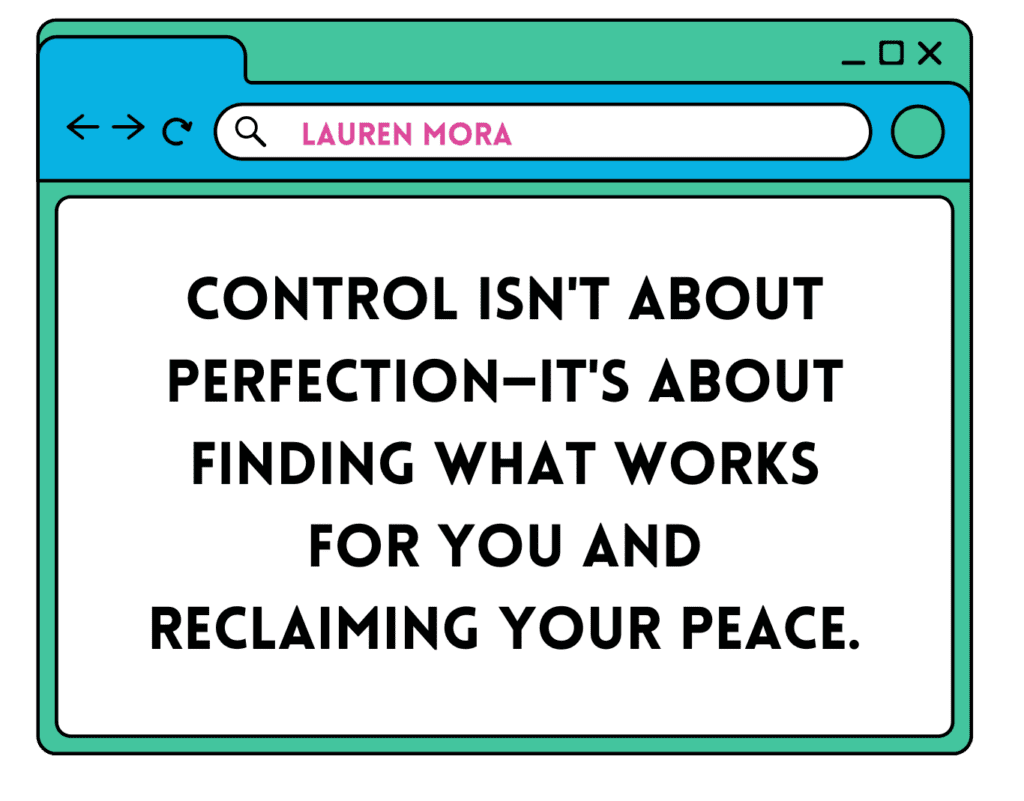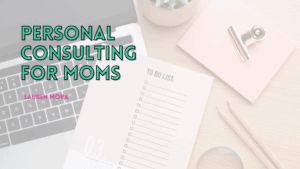Today, we’re exploring something that impacts every parent deeply but often goes unnoticed: parenting and control. Yep, the C-word. (And no, not that one, you cheeky thing.) Control, or more specifically, our relationship with it, shapes so much of our day-to-day parenting experience. Whether you consider yourself a control freak (and wear that badge proudly) or feel like you’re completely out of control right now, this post is for you.
Let’s break it down into three key areas where control (or the lack of it) shows up in our lives as parents. I’ll also share what I’ve learned from my own experience, and give you actionable tips on how to reclaim your sense of peace. So, grab your coffee and settle in, because we’re about to get real.
Table of Contents
Where Control (or the Lack of It) Shows Up in Parenting
Control Over Your Stuff
Let’s start with the obvious: control over the stuff. You know, the endless details of parenting life—meals, groceries, scheduling, tidying, laundry, misbehaving dishwashers (ugh, does no one load them correctly?!).
Before kids, it was fairly simple. If you were Type A like me, this may have looked like keeping a spotless house or color-coded calendar. You were in control of it all. But then came the tiny humans—along with their nap schedules, school pick-ups, snack preferences, sports practices, and chaos you never anticipated.
Suddenly, the minutiae take over. Personally, I lived in overdrive when my kids were little. Nap schedules couldn’t budge a minute. Babysitters got detailed PDF schedules (seriously). Keeping control over these small details became an Olympic sport, and I was vying for the gold.
But here’s the thing: staying “on top of it all” doesn’t lead to peace; it leads to stress. And while some might say, “Let it go! A messy house is fine,” people like us know that doesn’t fly. (A cluttered house = a cluttered brain, am I right?)
Still, we can’t let the minutiae run the show. So where do we go from here? More on that soon—but hold tight, we’ve got two more places where control (or lack of it) loves to rear its head.
Control Over Your Schedule (Or the Lack Thereof)
Oh, for the days when you could just binge Netflix on a Saturday—or call up a friend for drinks on a whim. Now your “free” time is a distant memory, as your schedule is dictated not by you, but by meals, homework, soccer games, and bedtimes.
This is one of the hardest transitions for parents—feeling like your time is no longer your own. Add in sleep deprivation (hello, decade of 1:00 a.m. wake-ups) and an endless to-do list, and it’s no wonder we feel burnt out.
For me, this one is uniquely tricky. I work from home while my husband’s job demands long, inflexible hours outside of the home. This means I’m often juggling everything alone. The mental load is staggering. Sure, I’ve figured out ways to carve out time for myself, but relinquishing control over my schedule has been one of the hardest parts of this phase of life.
Control Over Your Emotions: Hello, Hormones
Now let’s talk about the sneakiest—and most personal—aspect of control: emotional regulation.
Whether it’s postpartum hormones, perimenopause, or just the rollercoaster that is parenting, our ability to stay emotionally in control gets tested daily. From toddler tantrums to tween eye rolls, keeping your cool can feel impossible.
For me, this emotional volatility was a wake-up call. I wasn’t just annoyed when things didn’t go as planned—I was raging. I’d hide in my closet to cry or shout when the kids were just being kids. And I hated feeling like this version of myself.
Over time (and with help—more on that below), I realized my hormones were completely out of whack. It wasn’t just me; it was biological. Understanding this felt like gaining a superpower because I could finally do something about it.
5 Strategies to Regain Control and Reduce Mom Stress
Okay, now that we’ve identified where control—or the lack of it—shows up, let’s talk solutions. Here are five strategies that have transformed my life and might just do the same for you:
1. Regulate Your Hormones
If you’re experiencing anxiety, mood swings, or postpartum blues years after giving birth, it might be hormone-related. I saw a Functional Hormone Specialist who ran detailed labs and put me on bioidentical hormone replacement therapy. The change? Night and day. Less rage, less weeping in closets, and more calm Mama energy. If this sounds familiar, find a trusted expert who can run tests and help you regain balance.
2. Lean on Experts
You don’t need to figure everything out alone. Whether it’s a baby sleep coach, a business mentor, or a therapist, let the experts be the experts. One of my favorite mindset shifts came from the book Who Not How, which teaches you to stop asking, “How can I fix this?” and start asking, “Who can help me?”
The best way to reduce stress as a mom is to prioritize self-care and seek support from experts.

3. Make Self-Support Non-Negotiable
Every week (sometimes daily), ask yourself: What do I need to feel supported right now? Schedule it—whether it’s five minutes of breathwork, a long shower with zero interruptions, or a guilt-free coffee run. These small moments keep you sane, and you’re the only one who can make sure they happen.
4. Say What You Need
Newsflash: Your partner can’t read your mind. (Big shock, I know.) I’ve started voicing my biggest stressors during our weekly planning sessions so we can tackle them together. And in the moment? If it’s all too much, I say so. Because honestly, slamming pots until someone notices isn’t the best strategy.
5. Find the Sweet Spot Between Control & Chaos
It’s tempting to micromanage every detail—or swing to the opposite extreme of “letting it all go.” The magic lies in the balance. Plan what matters and leave space for serendipity. For me, this looks like scheduling both structured activities (hello, baking cookies!) and leaving intentional blank space in my calendar for simple play or rest.

Final Thoughts: Parenting and Control
What causes burnout in parenting? It’s often tied to losing control over schedules, emotions, and daily details.
Here’s the truth: control will always be a tricky dance for parents. But when we pinpoint where we’re feeling burned out—whether it’s the details, our schedules, or our emotions—we can start making small changes.
It’s not about perfection, but about finding the balance that works for you and your family. I hope this gave you some clarity about the areas you’re struggling with—and maybe even inspired you to take your first step toward reclaiming your peace.
You’ve got this, Mama. 💪
Key Takeaways: Practical Tips to Reclaim Emotional Balance and Time
- Control over details, schedules, and emotions can often leave parents feeling overwhelmed.
- Hormone imbalances may be contributing more to your stress than you realize—seek professional support if this resonates with you.
- Ask yourself daily: What do I need right now?
- Stop doing it all: Lean on experts, your partner, or even a friend instead of bearing the mental load alone.
- Find your happy medium between control and chaos by planning with intention and leaving space for spontaneity.
Let’s Connect
Feeling overwhelmed by the details of parenting?
Let’s connect on Instagram @itslaurenmora for more tips on finding balance and reclaiming control!







